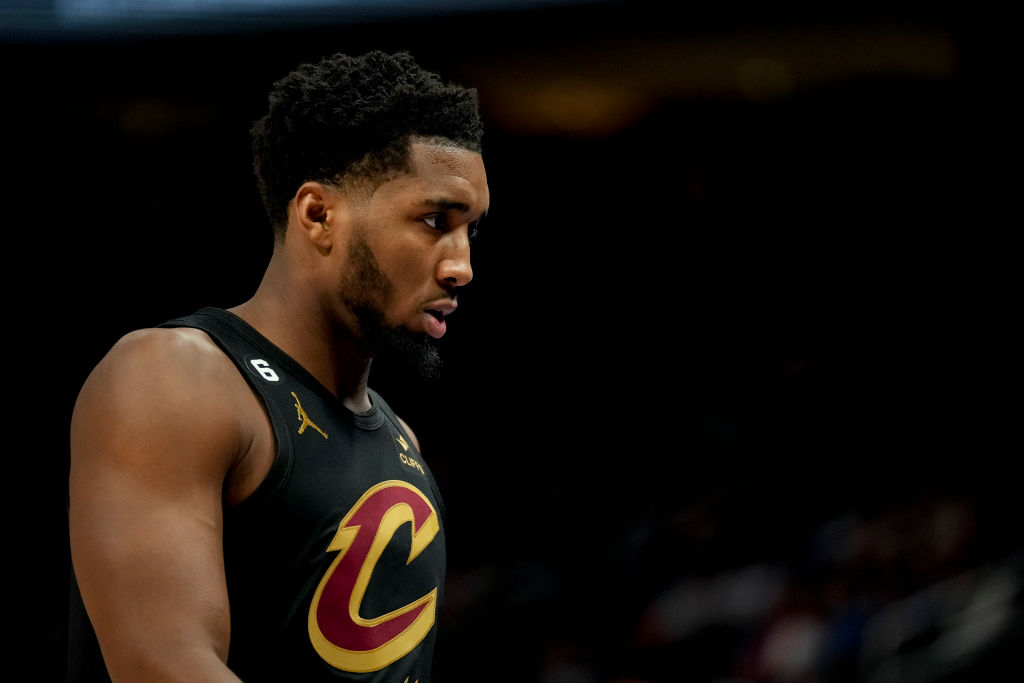
Source: Nic Antaya / Getty
Being Black in all-white spaces is a challenge even for multimillionaire basketball players. Donovan Mitchell who now plays for the Cleveland Cavaliers found that out the hard way while playing for the Utah Jazz.
The 13th pick in the 2017 NBA draft, Mitchell played five years for the Jazz with a stat line of 23.9 points, 4.5 assists, and 1.3 steals. Yet the team struggled to find wins out of the regular season and Mitchell’s relationship with former Jazz center Rudy Gobert faltered. Though Gobert was traded, Mitchell’s time in a Jazz uniform ended in September when he, too, was traded, to Cleveland.
But not before the three-time All-Star experienced what he says were multiple racist incidents that dovetailed with his increasing outspokenness off the court. Mitchell grew up in a suburb of New York City, then went on to play college ball at the University of Louisville. Playing in predominantly white and Mormon Utah was a sobering experience. In an interview with Marc Spears of Andscape, Mitchell said the overt and implied racism began to wear him down.
“It’s no secret there’s a lot of stuff that I dealt with being in Utah off the floor. If I’m being honest with you, I never really said this, but it was draining. It was just draining on my energy just because you can’t sit in your room and cheer for me and then do all these different things. I’m not saying specifically every fan, but I just feel like it was a lot of things. A state senator saying I need to get educated on my own Black history. Seeing Black kids getting bullied because of their skin color. Seeing a little girl hang herself because she’s being bullied.
Man, it was just one thing after another. And I will say, it’s not the only place it happens. But for me, I’m continuing to be an advocate for [racial equality] and to receive the amount of pushback I got over the years, it was a lot.”
Mitchell says that when he was pulled over by police in Utah, the interaction ended on a good note, but only once the officer realized who he was, according to his account.
“I got pulled over once. I got an attitude from a cop until I gave him my ID,” Mitchell said. “And that forever made me wonder what happens to the young Black kid in Utah that doesn’t have that power to just be like, ‘This is who I am.’ And that was one of the things for me that I took to heart.”
In 2020, Mitchell was among a group of NBA players who were outspoken on the racial issues that led to the deaths of Breonna Taylor, Ahmaud Arbery and George Floyd. That year, playing in the NBA bubble was even more challenging because of his activism.
“It first started, when I posted a photo for Juneteenth, and it said ‘Free-ish’ before the [NBA] bubble. And really in the bubble, too, people just started nonstop going at me like, ‘Man, you don’t know what you’re talking about. There is injustice everywhere. It’s not just Black people.’ I’m just like, ‘Y’all have no idea.’ I took on a lot because I felt like I could do it. But at some point, it became a lot to have to deal with.”
Mitchell does point to one thing he was part of in Utah that he feels made a positive difference. In the 2020-2021 season, the team gave away full-ride scholarships to students from underserved communities for each Jazz win. The Jazz won 61 games that year, awarding 30 scholarships. The other 31 will be awarded during the 2022-23 season.
“The [Utah Jazz] scholarship piece is the thing that hits home the most for me. Being able to pay for full room and board … that’s one of the coolest things just because it’s not just basketball. You’re not just playing to win it. You’re playing for something deeper than life. It’s not just about yourself. That’s something that really resonates and hits home for not just me, but everybody. I feel like we were playing for that. We were able to impact lives for generations.”
Mitchell says he hopes to have that kind of impact on the Black community in Cleveland where he admittedly feels more comfortable. He says his Spidacares foundation, run by his mother, is coordinating with the Cavaliers community outreach staff to find ways to contribute. Beyond playing ball, that’s where Mitchell feels he can be the most impactful by using his privilege and platform to help others.
“The biggest thing I’m proud of right now is just being able to be in the community. Literally, I’d be at [high school] basketball games. I would go there because I know I would’ve done anything for an NBA athlete to be at my high school games. I understood who I was in the community and what that did for kids. You never know what a kid is going through on a daily basis. You never know what one moment will do for a child in their life, let alone that day.”
















